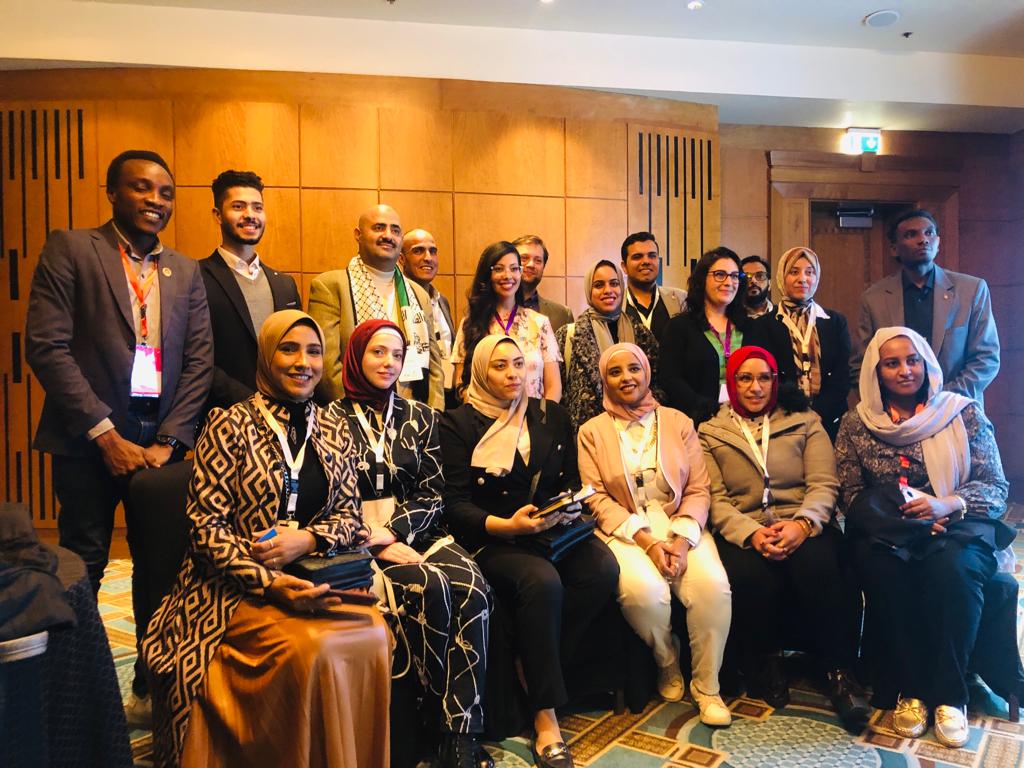This week, elections in Egypt will cast a referendum on the presidency of Abdel Fattah el-Sisi, in power since 2014. Major elections are looming elsewhere in the Middle East and North Africa in the next year, too, including in Tunisia and Algeria.
Globally in 2024, half of the world’s population – over 4 billion people – will be voting in elections. For journalists covering them, knowing how best to utilize social media is key, both to inform audiences and to combat mis- and disinformation.
At the 2023 Egypt Media Forum, ICFJ Program Management Consultant Fadwa Kamal and Jim Hoge Reporting Fellow Mais Katt led in-depth trainings on how to utilize social media, data and visuals when reporting on elections. They also introduced participants to helpful fact-checking tools, and discussed ethical challenges journalists face on social media.
“The evolving landscape of election coverage poses many challenges for journalists, the most pressing of which is the increasing difficulty in capturing and holding people's attention,” said Katt. “The success of election coverage hinges on a careful balance of participation and media. Engaging data, compelling visuals, and powerful narratives emerge as critical elements in achieving this synergy.”
Here’s more from the sessions:
The impact of social media on elections
Social media is increasingly central to how people understand and engage with elections.
This has some positive impacts, such as improving voter participation, especially among young people and marginalized communities. It has also increased campaign transparency, as social media enables real-time updates that allow journalists to better monitor election campaigns.
However, social media also facilitates the spread of mis- and disinformation, which can over time undermine trust in democratic institutions. It can lead to targeted online harassment and cyberbullying against candidates, activists and journalists, and provide opportunities for foreign actors to meddle, for instance by manipulating public opinion around a candidate.
Social media algorithms tend to create filter bubbles and echo chambers, too, which expose users primarily to content that aligns with their existing beliefs. “This limits their exposure to diverse viewpoints and reinforces biases, which can lead to further polarization and hinder informed decision-making,” said Kamal. “This necessitates journalists master fact-checking skills and debunk misinformation and disinformation to provide their audience with accurate and reliable information.”
Engaging audiences on social media
Today, people increasingly get their news from social media. While there’s no “one template that fits all” to engage users on social media, a few key tips that can help boost engagement:
- Diversify content. Include a variety of images, videos, graphs, infographics and opinion polls to better engage your audience with your content.
- Reply to comments. Implement clear policies in newsrooms on when and how to respond to comments and questions on social media. Be upfront about what this requires: while consistently replying to comments will improve audience engagement, it can also require significant time and resources to maintain.
- Interact with your audience. Even if you can’t consistently reply to comments, having your audience feel like they have a voice in your outlet’s coverage through social media is key. Follow user accounts, retweet and share your followers’ posts, and survey or poll them on different topics.
- Implement live sessions. X (formerly Twitter) Spaces, Instagram Live and Facebook Live are effective ways to communicate with your audience and answer questions in real time. This can help involve your audiences more dynamically, and lead them to feel a greater sense of participation in the outlet.
As elections draw near, implementing these techniques can help outlets get the most out of their audiences on social media. “Our stories are not only happening in the streets and within election centers, but on the internet, where candidate rivalries, scandals, violations, and voter aspirations and concerns all find a presence,” said Katt.
Preventing the spread of electoral mis- and disinformation
Inaccurate information is rife on social media. Your elections coverage will often show up in your followers' feeds alongside misleading content. “Social media is a fertile ground for misinformation and fabricated information, because it is easy to share information quickly and comprehensively,” said Katt.
Hate speech can be considered any message that incites violence, discrimination, social and political tensions, defamation, or hostility against a given group of people based on inherent characteristics. There is an important distinction between harsh political or social criticism and hate speech, Kamal said.

During elections, when emotions are at their highest, hate speech may be disseminated by campaigns, the candidates, and their supporters. Journalists can be targets in these situations, even as they fight to counter it.
When identifying whether or not a given statement is hate speech, Kamal said, consult civil society organizations and experts who have experience identifying hate speech. Importantly, fight hate speech in a way that doesn’t inadvertently platform it and increase its reach. As always, verify information from multiple sources before publishing it.
“Covering elections in the age of social media is a difficult task, but it is crucial,” said Kamal. “Journalists have a responsibility to provide the public with accurate and reliable information about candidates and issues.”